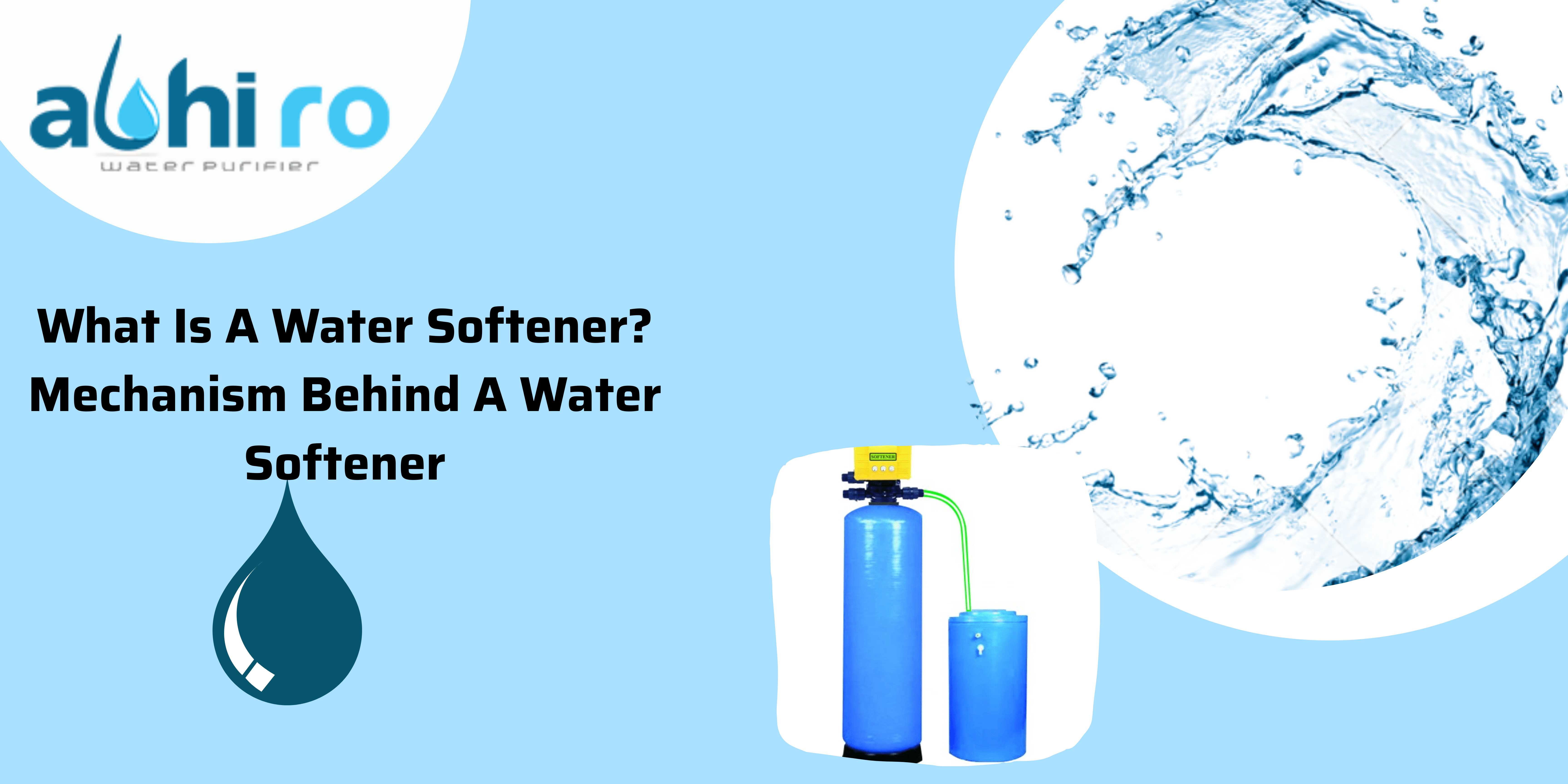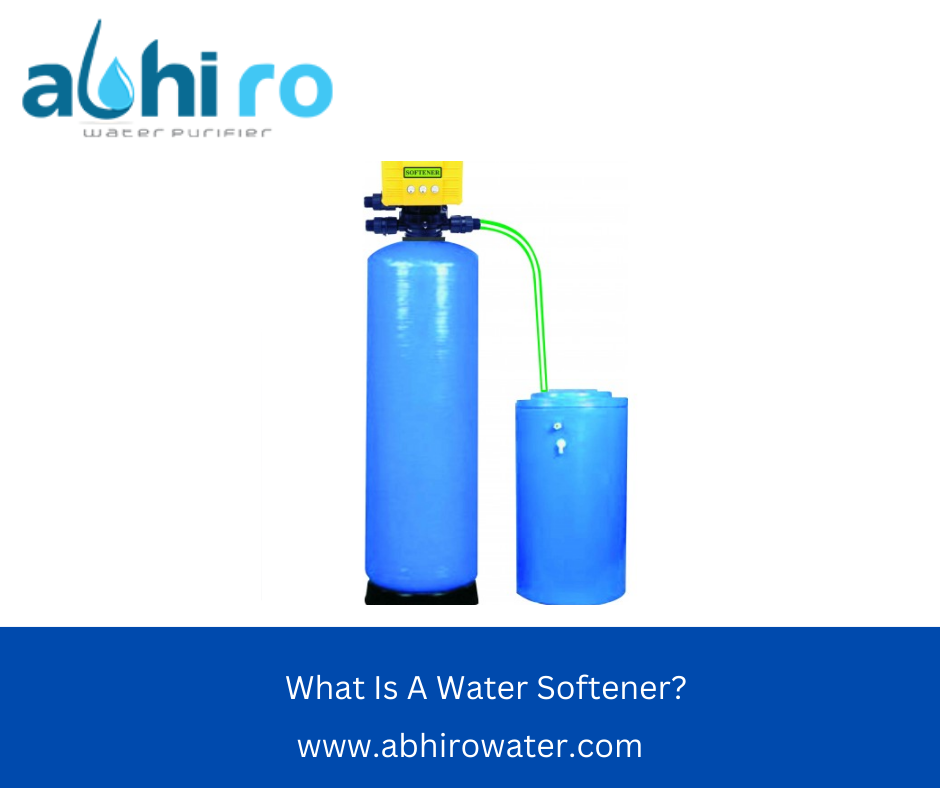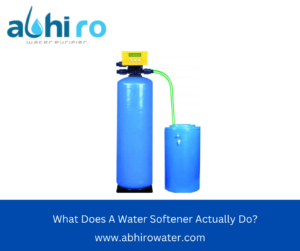Do you want to know about water softeners then this blog, “what is a water softener? Mechanism behind a water softener” is all about it. Water softeners are a type of filtration system that uses ion-exchange resin to remove calcium and magnesium ions from hard water.
These ions are exchanged for sodium ions, which creates a softer water stream. Water softeners are often used in households with hard water to reduce the amount of scale build-up on appliances and pipes.
A water softener is a device that is used to remove magnesium and calcium ions from hard water. These ions are responsible for creating soap scum, scale deposits, and making it difficult for soap to lather.
A water softener works by exchanging the magnesium and calcium ions in hard water with sodium or potassium ions. This process is known as ion exchange. The sodium or potassium ions do not cause soap scum or scale deposits.
As a result, your soap will lather better and your dishes and clothing will be cleaner. In addition, your plumbing will thank you because there will be less build-up of scale deposits in your pipes.
While a water softener is a great way to improve the quality of your water, it is important to keep in mind that it does not remove all contaminants from your water. For this reason, it is still necessary to use a water filter in conjunction with a water softener.
What Is A Water Softener? Mechanism Behind A Water Softener
A lot of people don’t know much about these devices, even though they are incredibly important for households that use hard water. In this blog post, we will discuss what a water softener is, the mechanism behind it, and why you might need one in your home!
A water softener is a device that is used to remove hard minerals from water. Hard water contains high levels of calcium, magnesium, and other minerals which can cause a variety of problems.
These minerals can build up on fixtures and appliances, making them less efficient and more difficult to clean. They can also cause soap scum and mineral deposits to form on your skin and hair. In some cases, hard water can even make it difficult to get laundry clean!
The way that a water softener removes these minerals by exchanging them with sodium ions. This process is known as ion exchange, and it occurs inside the softener tank. As hard water passes through the tank, the calcium and magnesium particles are attracted to the sodium ions. This exchange process continues until the water becomes soft.

If you live in an area with hard water, it is important to have a water softener installed in your home. This will help to protect your plumbing and keep your appliances and fixtures in good condition. It can also improve the quality of your drinking water and make it easier to get your laundry clean!
Now that you know what a water softener is and how it works, you might be wondering if you need one in your home. If you have hard water, there’s a good chance that you do! If you’re not sure, there are a few things that you can look for:
-Stains On Fixtures Or Appliances: If your fixtures or appliances are starting to look dingy or stained, it could be because of hard water.
-Soap Scum: Soap scum is a film that can build up on surfaces when hard water is present. It can be difficult to remove and can make your fixtures and appliances look dirty.
-Laundry Problems: Hard water can make it difficult to get laundry clean. If you notice that your clothes are not as bright as they used to be or that they’re not getting as clean, it might be time to install a water softener.
If you think that you might need a water softener, the next step is to find the right model for your home. There are a few different things that you’ll want to consider, including the size of your home and the hardness of your water. Once you have all of this information, you’ll be able to choose the perfect water softener for your needs!
How Do Water Softeners Work?
Hard water is water that contains high levels of dissolved minerals, such as calcium and magnesium. These minerals can cause a number of problems, including scale buildup in plumbing fixtures and decreased efficiency of water-using appliances.
A water softener is a device that removes these dissolved minerals from water, making it softer. There are a few different types of water softeners, but the most common type uses ion exchange to remove minerals.
In this process, the hard water is passed through a chamber that contains negatively charged ions. The positively charged minerals in the water are attracted to the negative ions and exchange places with them.
As a result, the water becomes softer. The ion exchange process must be periodically regenerated, which involves flushing the chamber with a salt solution. Water softeners are an effective way to improve the quality of your water and protect your plumbing fixtures and appliances from scale buildup.
Abhiro – Best Water Softener In The Market
Abhiro is a leading provider of water softening solutions. Our systems are designed to deliver superior performance, providing superior quality softened water for your home or business. Abhiro provides an extensive range of innovative products that provide exceptional value for money and can be tailored to suit any application.
Our systems are designed to remove calcium and magnesium from hard water in order to make it softer and easier on skin, pipes and appliances. This also helps reduce the amount of soap required for cleaning as well as reducing scale build-up which can damage plumbing fixtures over time. Softened water also tastes better, making it ideal for drinking.
At Abhiro, we strive to ensure our customers’ satisfaction by delivering the highest quality of service possible. We provide easy to understand and detailed installation instructions for all our products, ensuring that even those who are not technically minded can install them successfully. We also offer comprehensive aftercare service and maintenance packages for our range of water softeners, so you can relax knowing your system is in safe hands.
We have a wide selection of products ranging from entry-level systems to top-of-the-range units with advanced features such as touch screen displays and remote access via smartphone or tablet. No matter what your needs may be, Abhiro has the right solution for you at a price that won’t break your budget.
What Is Hard Water? How Is It Different From Normal Water?
Hard water is a type of water that contains more dissolved minerals than ordinary or soft water. These dissolved minerals are typically calcium, magnesium, and iron, although other trace elements may also be present in smaller amounts. Hard water can come from surface sources, like rivers and lakes, or from underground aquifers.
The difference between hard water and regular tap water lies in the number of particles suspended within it. Regular tap water has fewer particles than hardwater as it’s gone through treatment processes to reduce the level of impurities. Hard water on the other hand, has higher levels of mineral ions such as calcium and magnesium bicarbonate which contribute to its hardness and give it an unpleasant taste sometimes.
When hard water is used for things like washing and bathing, it can leave a residue on surfaces or create soap scum. This can be caused by the minerals reacting with soaps to form insoluble precipitates which are otherwise known as soap scum. Hard water can also reduce the lathering ability of soaps, cause damage to pipes and appliances, and increase levels of scale buildup in water heaters.
In contrast, soft water has fewer suspended particles than hard water so it’s more pleasant-tasting and won’t leave any residue behind. It generally comes from rainwater sources that have been filtered through layers of soil before reaching an aquifer. Soft water is often seen as more desirable because it doesn’t leave a mineral residue behind and is less likely to cause damage to pipes, appliances and fixtures than hard water.
Ultimately, the best way to tell if your tap water is hard or soft is by consulting with a local water quality expert. They can analyse the mineral content of your home’s water supply and suggest the best solution for dealing with it, such as installing a water softener system. Knowing what type of water you have will help ensure that you get the most out of your home’s plumbing and appliances, while also keeping them free from any potential limescale buildup.
How To Recognize Its Hard Water?
Hard water is a type of water that is high in mineral content such as calcium, magnesium, and other metallic ions. It can be difficult to tell whether you have hard or soft water without testing it. However, there are some key indicators that suggest you may have hard water in your home.
The most common signs of hard water include spots on dishes after washing them, clothing fading or becoming dingy from laundering, and soap scum buildup on sinks and bathtubs. It can also cause plumbing fixtures to become discoloured due to metal deposits. You may even notice a strange taste or smell in your drinking water.
If you suspect that you might have hard water, the best way to confirm it is to test it. You can purchase a hard water testing kit at most home improvement stores, or you can hire a professional water treatment company to do the testing for you. Once the results are in, they will be able to recommend the right course of action based on your specific needs.
In some cases, hard water can be treated with various types of filtration systems such as reverse osmosis and ion exchange. These systems remove minerals from the water, leaving it soft and pleasant to use. In other cases, additives such as salt may need to be added to “soften” the water. Your local water treatment provider will be able to provide advice about which solution is best for your situation.
If you think you have hard water, testing and treatment are the best ways to confirm it and make sure your water is safe for drinking and other uses. Understanding what hard water is and how to recognize it is an important part of keeping your home healthy.
What Are The Benefits Of Water Softener?
Water softeners are a popular choice for those seeking to improve the quality of their home’s water. They provide a number of benefits, such as making soaps and detergents more effective, reducing mineral buildup in pipes, and enhancing water taste. Water softened with a water softener also lathers better and helps your clothes look cleaner in fewer washes. Homeowners can rest assured that the calcium and magnesium which causes hardness in water is gone when it is softened with a water softener – leaving them with smoother skin on their hands and face.
Commercial businesses often benefit from using a water softener as well, due to decreased build up of scale deposits in pipes and equipment. Ultimately, the use of a water softening system will save money by not only making daily processes easier but by avoiding any costly repairs from hard deposited minerals that clog systems or break down parts.
FAQs: What Is A Water Softener
Q 1: What Are The Names Of The Components Of A Water Softener?
A 1: A control valve, a mineral tank, and a brine tank are the three parts of a water softener. Together, these three devices monitor water flow, take out the minerals from hard water, and periodically clean the system by regenerating it.
Q 2: How Is A Water Softener Connected?
A 2: The water supply line of the house is connected to the softener tank. The softener tank and brine tank are connected via a fill tube with a modest diameter. Additionally, a discharge tube connects the softener tank to a nearby dry well or drain pipe.
Q 3: How Does A Water Softener Drain Its Tank Of Brine?
A 3: The resin beads are “washed” by a highly concentrated solution called brine, which is made from the salt in the tank. It forces the minerals out of the resin beads and replaces them with sodium ions. The brine solution and hardness minerals are washed out of the softener through the drain.
Final Thoughts
In conclusion, a water softener is an appliance that uses different methods to remove hard minerals from water. The most common type of water softener is the salt-based system which exchanges sodium ions for calcium and magnesium ions in the water.
This process makes the water less likely to form scale or soap scum and also makes it feel smoother on your skin. If you’re interested in installing a water softener in your home, be sure to consult with a professional to find the best model for your needs.








